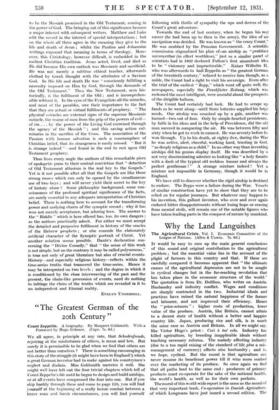" The Greatest German of the loth Century "
Count Zeppelin. A biography. By Margaret Goldsmith. With a Foreword by Hugo Eckener. (Cape. 7s. 641) WE all agree, in principle at any rate, that Schadenfreude, rejoicing at the misfortunes of others, is mean and low. But surely it is permissible to be glad when we find that others are not better than ourselves ? There is something encouraging in this story of the struggle (it might have been in England !) which a great German inventor had to make against his countrymen's neglect and disdain. Miss Goldsmith narrates it well. She might well have left out the four trivial chapters which tell of Count Zeppelin's life until he began to design and build airships, or at all events have compressed the four into one. But if you skip hastily through these and come to page 110, you will find yourself at the beginning of a really heroic combat between a brave man and harsh circumstances, you will find yourself
following with thrills of sympathy the ups and downs of the Count's great adventure.
Towards the end of last century, when he began his real career (he had been up to then in the army), the idea of air navigation was derided. He was known as " the crazy Count."
He was snubbed by the Prussian Government. A scientific commission stigmatized his plan of -an airship as " prahlisch unrerwertbar (in effect worthless)," just as a similar panel of scientists had in 1802 declared Fulton's first steamboat idea to be " visionary and impracticable." Kaiser Wilhelm II, who was afterwards to hail Zeppelin as " the greatest German of the twentieth century," refused to receive him though, as a noble, the Count had a right to visit his sovereign. Even after the trial of the earliest " Zepp," which went off quite well, the newspapers, especially the Frankfurter Zeitung, which was reckoned the most intelligent, were scornful about the prospects of the dirigible balloon.
The Count had certainly bad luck. He had to scrape up funds as he went along—until State lotteries supplied his large needs. One airship was smashed up by a gale, another was burned—two out of four. Only by simple-hearted persistence, by faith in his ideas and in the help of Providence, did the old man succeed in conquering the air. He was between fifty and sixty when he got to work in earnest. He was seventy before he won through. Up to his death, at eighty-five, during the War he was active, alert, cheerful, working hard, trusting in God, " as deeply religious as a child." In no other way than inventing airships did his genius display itself. He was described by a not very discriminating admirer as looking like " a holy fanatic with a dash of the typical old reckless hussar and always the perfect gentleman ! " A strange mixture indeed ! Yet a mixture not impossible in Germany, though it would be in England.
We have still to discover whether the rigid airship is destined to endure. The Zepps were a failure during the War. Vessels of similar construction have yet to show that they are to be relied on for regular journeys. But whatever may happen to his invention, this gallant inventor, who over and over again endured bitter disappointments without losing hope or ceasing from mental strife, will remain one of the notable figures who have taken leading parts in the conquest of nature by mankind.






























 Previous page
Previous page